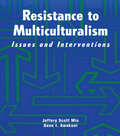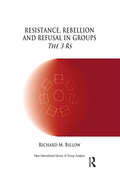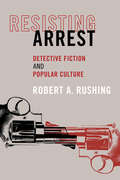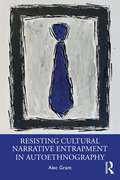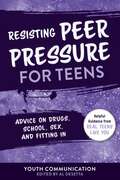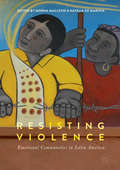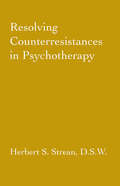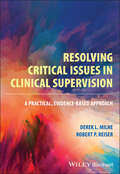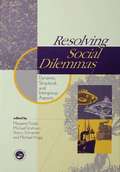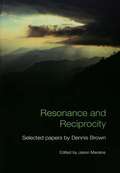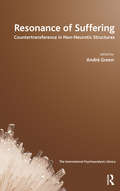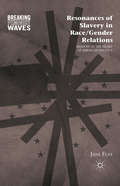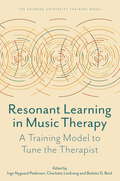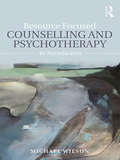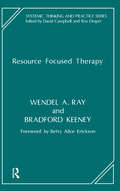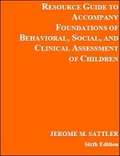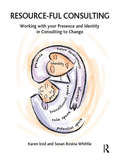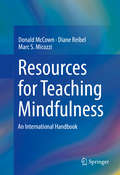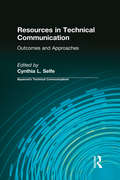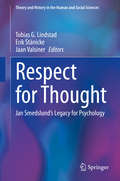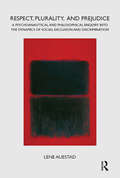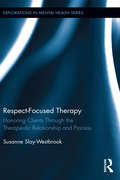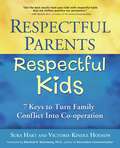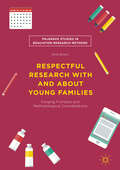- Table View
- List View
Resistance to Multiculturalism: Issues and Interventions
by Jeffery Scott Mio Gene I. AwakuniFirst published in 2000. Routledge is an imprint of Taylor & Francis, an informa company.
Resistance, Rebellion and Refusal in Groups: The 3 Rs (The New International Library of Group Analysis)
by Richard M. BillowThe author expands and develops his ideas, first presented in Relational Group Psychotherapy: From Basic Assumptions to Passion. He constructs a theoretically sophisticated, yet experience-near approach to contemporary group therapy. Building on Bion's striking theoretical realignment, replacing the polarity unconscious-conscious with infinite-finite, the author revises traditional concepts and terms to offer a new model of relational group psychotherapy.In this book he defines the essential therapeutic task: to address the hunger for truth, an appetite stimulated by the group itself. Group members bring infinite potential into the room, but the truth that is developed and realized is bounded by the nature of their interrelationships, individual psychologies and perspectives, as well as by human limitations in processing experience to make it meaningful. How the therapist, along with group members, assess and respond to the need for truth, in the immediate clinical context, create the phenomena of resistance, rebellion, and refusal.
Resisting Arrest (Cultural Studies)
by Robert A. RushingA volume in the Cultural Studies Series edited by Samir DayalAn innovative and entertaining look at genre, popular culture, enjoyment, and psychoanalysis.Detective fiction, a category that, broadly defined, runs the gamut from Oedipus Rex to "The Purloined Letter," continues to draw a range of fans and scholars, and to play a pivotal role in popular entertainment, contemporary literature, and psychoanalytic theory. But how do we derive pleasure from reading about or watching a detective’s exploits? Is our enjoyment in the vicarious experience of genius? Or in witnessing the commission of a crime, an equally vicarious experience of violence?Resisting Arrest looks at the detective genre in its many different cultural manifestations, from popular fiction (Christie) to high literature (Eco), from art films (Antonioni) to popular television series (Monk). In each case, Rushing finds that detective stories have less to do with fulfilling our hidden desires, as psychoanalytic explanations have traditionally asserted, than with purposively thwarting them. He argues that the genre is in fact constituted principally by the promises on which it fails to deliver, including the vicarious experience of both genius (readers expecting to play Sherlock Holmes are almost always cast as Watson) and antisocial violence, so that our pleasure is based on what Slavoj Zizek has called "the endless circulation around the always-missed object." Organized around the key ideas that structure the detective genre ("Desire," "Repetition," "Violence"), Resisting Arrest offers a thoroughly new interpretation that will appeal to scholars interested in questions about genre and cinema studies, popular culture, and psychoanalysis.
Resisting Cultural Narrative Entrapment in Autoethnography
by Alec GrantResisting Cultural Narrative Entrapment in Autoethnography delves into the nexus of cultural narratives and takes the reader on a journey through the intricate landscape of identity and cultural critique. Each chapter, enriched with dialogues with 'Ash,' our imaginary interlocutor, presents a profound exploration rooted in the philosophical fabric.This book amplifies the discourse on ontological and epistemological reflections often overlooked in narrative autoethnography. Central to its narrative is the concept of cultural narrative entrapment, meticulously dissected to unveil its philosophical underpinnings. It focuses on probing inquiries, from the essence of resistance to cultural narrative entrapment to its pivotal role in shaping autoethnographic scholarship. Through meticulous textual 'archaeology' chapters unfold, excavating layers of literature to redefine cultural identity and narrative constructs, offering a meta-autoethnographic lens. The discourse evolves, addressing critiques and paradoxes, while inviting readers to engage with the complexities of perception, representation, and the paradoxes of emplotment. Culminating with an illuminating appendix summarising the author's extensive body of work, this book serves as a beacon for scholars and practitioners navigating the nuanced terrain of philosophical autoethnography.This book transcends the boundaries of traditional scholarship, offering a compelling narrative that challenges conventions and ignites intellectual curiosity. It is an indispensable companion for those seeking to unravel the profound intersections of culture, identity, and philosophical inquiry.
Resisting Peer Pressure for Teens: Advice on Drugs, School, Sex, and Fitting In (YC Teen's Advice from Teens Like You)
by Youth CommunicationIn Resisting Peer Pressure for Teens, young writers show that it&’s possible to stand up to the pressure they may feel from friends and some family members to be "cool." Inspire teen and preteen readers to take responsibility for and make wiser decisions about their lives with the essays in this book—each written by a teenager. Within these pages, Jamel A. Salter, Fan Yi Mok, and Charlene George, and many others, describe how and why they chose to keep it real and fight back against the pressure they felt from friends to use drugs and alcohol; have sex too early; lie, cheat, and steal; and skip or act out in school. Essays include: My Secret LoveLosing My Friends to WeedWhy Do So Many Teens Cheat?Can't Afford to FollowHiding My Talent No MoreWhy I Speak My MindSex Doesn't Make You a ManMy So-Called FriendsMaking Me DancePeer Pressure Ended Our RelationshipI Want to Be Pretty and PopularThe Trouble with Being a VirginThinking for Myselfand more! Through these essays, teen readers will pick up new ways to say no and advice that will help them stay true to themselves, while parents, teachers, and caregivers will be provided a much-needed glimpse into how the world looks to our younger generations.
Resisting Violence: Emotional Communities in Latin America
by Morna Macleod Natalia De MarinisThis book focuses on emotional engagement in academic research with victims of violence and testimonial documentation in Latin America. It examines the recent history of resistance to violence and political repression in Latin America, highlighting the role of emotions in the political sphere. The authors analyse the role of researchers committed to social change and question the mandate of distance and neutrality in academic research in contexts of extreme violence. They use case studies of social resistance to political violence in Mexico, Guatemala, El Salvador, Nicaragua, Colombia and Chile.
Resolving Counterresistances In Psychotherapy
by Herbert S. StreanFirst published in 1993. Routledge is an imprint of Taylor & Francis, an informa company.
Resolving Critical Issues in Clinical Supervision: A Practical, Evidence-Based Approach
by Derek L. Milne Robert P. ReiserRESOLVING CRITICAL ISSUES IN CLINICAL SUPERVISION Address key challenges in clinical supervision with this comprehensive account of common critical issues faced by almost all practitioners Clinical supervision is a crucial aspect of clinical practice across the health and social professions. It can directly impact patient outcomes, shape clinical careers, and generally enhance professional development more broadly. The relationship between a clinical supervisor and their supervisees is therefore a hugely important one, embedded within challenging health and social care settings, which produces unique and complex challenges, but for which little formal guidance exists. Resolving Critical Issues in Clinical Supervision answers the need for guidance of this kind with a practical, accessible discussion of major challenges and their possible solutions, drawing on the best available evidence from research, expert consensus, and relevant theory. It provides dedicated advice for supervisors and supervisees, alongside suggestions for the clinical service managers and associated others who aim to resolve the most common critical issues. The result is an extensively researched and wide-ranging guide which promises to make sense of the main challenges, describe the best-available coping strategies, and thereby strengthen career-long clinical supervision. Resolving Critical Issues in Clinical Supervision readers will also find: Authors with decades of directly relevant clinical, research, and teaching experience Dedicated treatment of the most common critical issues, such as unethical supervisory practices, ineffective treatment, and the role of organizational structure in undermining clinical supervision An evidence-based approach that provides practical guidelines of relevance to many health and social care professions. Resolving Critical Issues in Clinical Supervision is a valuable guide for both clinicians and service leaders looking to establish and maintain best practices in clinical supervision.
Resolving Social Dilemmas: Dynamic, Structural, and Intergroup Aspects
by Michael Hogg Michael Smithson Margaret Foddy Sherry SchneiderThe Single European Market has been completed, and many barriers to the free mvoement of goods, services, labour and capital have been removed. Lively and accessible throughout, the book will be compelling reading for introductory students of economics.
Resonance and Reciprocity: Selected Papers by Dennis Brown
by Jason MaratosThis collection of papers, published between 1976 and 2003, traces the innovative connections which the eminent group analyst Dennis Brown made between medicine and psychoanalysis. They reveal his important insights into how the principles of group analysis can improve our understanding of philosophy and ethics, and trace the development of trans-cultural dimensions of group analysis. Beginning with Dennis’ early work in dermatology, the first section of Resonance and Reciprocity provides a fascinating overview of the insights gained into psychosomatic conditions through the application of psychoanalysis and group analysis. The second section builds on the tenet of group analysis that therapy should change the therapist as well as the client, addressing the changes that can take place in the therapeutic milieu, both in client and provider. The chapter on drowsiness, a modern classic, provides a significant contribution to our understanding of the emotional and physical changes that the therapist experiences during analysis, and its wider implications for our appreciation of how changes in mental and physical states are affected by a person’s emotional world. The final section reveals how Dennis Brown extended his interest and his activities beyond the individual, the small and the large group, and studied groups within and across cultures. This book provides not only a solid understanding of complex analytical notions but also opens the road for future development. It will appeal to students and professionals in psychoanalysis, psychotherapy and group psychotherapy.
Resonance of Suffering: Countertransference in Non-Neurotic Structures
by Andre GreenSome sixty years after the "Controversial Discussions" in the early 40s, this passionate book resurrects their spirit on a global scale. Under the aurthor's generous, tactful yet strong leadership, a small discussion group of noteworthy analysts of the International Psychoanalytical Association, coming from all the theoretical and geographical regions in today's psychoanalytic Babel, met several times over three years in order to deal, by way of the detailed discussion of their clinical experiences, with what to many of those involved was and still is a polemical concept: that of the borderline patient. Such a concept, widely accepted in the United States, remains controversial in many parts of the psychoanalytic universe, mainly in what concerns the multifaceted relationship between psychoanalytic and psychiatric categories. To be remarked upon is the sincerity put to play by the participants in expressing their doubts, their agreements and their disagreements in the heady process of developing a grasp on the others' viewpoint.
Resonances of Slavery in Race/Gender Relations: Shadow at the Heart of American Politics
by Jane FlaxJane Flax argues that a reciprocal relationship exists between unconscious processes and race/gender domination and that unless we attend to these unconscious processes, no adequate remedy for the malignant consequences of our current race/gender practices and relations can be devised. Flax supports her arguments using a variety of sources.
Resonant Learning in Music Therapy: A Training Model to Tune the Therapist
by Niels Hannibal Lars Ole Bonde Hanne Mette Ridder Stine Lindahl Jacobsen Ulla Holck Sanne StormResonant learning allows students to develop and fine-tune their therapeutic competencies through first-hand experiences: being in client roles themselves, being in preliminary therapist roles with co-students in client roles and reflecting on those experiences. These resonant learning processes are preparatory steps in developing a professional music therapist identity through internship and later employment positions and continuing supervision. Outlining the Aalborg model of resonant learning, developed at Aalborg University, Denmark, Resonant Learning in Music Therapy discusses the benefits and drawbacks of 'tuning the therapist' and encourages its integration into music therapy courses around the world.The book sums up research on resonant learning and presents core exercises, directives and vignettes from the training processes of the Aalborg model. Explaining how students' self-agency is enhanced by long-term personal experiences in group- and individual therapy, observing work with clients in an institutional setting, working with clients themselves, and undergoing close group and individual supervision, the editors and contributors also explore the benefits of implementing resonant learning within other therapist training programs and healthcare professions.
Resource Focused Counselling and Psychotherapy: An Introduction
by Michael WilsonTherapists sometimes ask: What supports you in life? What gets you through difficult times? Our ‘journey’ in life relies on a range of resources to equip and fulfil us. Knowing about these resources, however, is not enough: for lasting benefits, they must be bodily felt experiences. The aim of this book is to illustrate the holistic purpose of therapy to resource integration of the client. It draws upon extensive material to affirm that the practice of contemporary therapy benefits from insights gained from evolving neuroscience. Particular emphasis is put on the benefits of drawing on the dimensions of experience to strengthen ego processes like self-awareness and self-regulation, and engage with the depths of being, including ‘soul’. Resource Focused Counselling and Psychotherapy provides professionals with a comprehensive and integrative model of resource focused therapy, drawing upon clinical examples and the current range of research and theory surrounding this emerging approach. Additionally, the book contains a range of self-resourcing exercises and practices for each part of the integrative model, enabling individuals to develop self-resources for greater resilience and well-being in their own lives. This book is an important read for psychotherapists, psychologists and counsellors, including those working with trauma. It also provides valuable insights for modalities practising from a psycho-spiritual perspective, including Jungian and transpersonal psychotherapists.
Resource Focused Therapy (The Systemic Thinking and Practice Series)
by Bradford Keeney Wendel A. RayFor some time the family therapy field has been moving away from a problem-based approach to work with clients. Ideas such as "creating a new family story", focusing on strengths and solutions, and making contracts with family members have all shifted interest toward a new approach to therapy. The authors have been in the forefront of this thinking for several years and they have been experimenting with their ideas by working together with clients in order to create their own coherent, effective model for therapy. Resource Focused Therapy is the result!
Resource Guide for Assessment of Children: Cognitive Foundations and Applications
by Jerome M. SattlerThis volume provides extensive tables to help in interpreting the WISC-V, WPPSI-IV, SB5, DAS-II, and WJ IV COG. It also contains appendixes focusing on laws pertaining to children with special needs (IDEA, Section 504, and ADA), testifying as an expert witness, and test reviews.
Resource Guide to Accompany Foundations of Behavioral, Social, and Clinical Assessment of Children (Sixth Edition)
by Jerome M. SattlerResource Guide to Accompany Foundations of Behavioral, Social, and Clinical Assessment of Children (Sixth Edition)
Resource-ful Consulting: Working with your Presence and Identity in Consulting to Change
by Karen Izod Susan Rosina WhittleConsultants and practitioners working with change can feel at a loss as to how to help their clients move forward. Organisations get stuck in routine ways even when they have innovations in mind. Consultants get stuck in familiar interventions which no longer prove stimulating or effective. Such challenges to practice can preoccupy and reinforce these stuck positions. Drawing on the authors' experiences of working with the professional development of consultants and change-agents over many years, this book provides an asset-based approach to consulting, where the resources to work at this 'stuckness' come from the way that we think about and use ourselves: our Identity and our Presence. The authors propose that developing capacities to recognise and analyse who we bring into our consulting, and how we bring ourselves is central to resource-ful practice. Without a skill-ful integration of these resources, the potential for change can be compromised. In handbook format, the book is structured in seven sections: Potential Space, Identity, Presence, Role Space, Practice, Change, and Future Developments.
Resources for Teaching Mindfulness
by Donald Mccown Marc S. Micozzi Diane ReibelThis master-class-in-a-book isdesigned to guide teachers of mindfulness-based interventions (MBI) in continuingto develop more competence while raising global standards of practice andpedagogy. Starting with the central yet elusive concept of stewardship, it thenexpands upon the core components of MBI pedagogy. A series of reflective essaysby MBI teachers from around the world foregrounds differences and challenges inmeeting participants "where they are. " Such reflections are both inspiring andthought-provoking for teachers --wherever they are. The book also providespractical guidance and tools for adjusting teaching style and content forspecial populations, from chronic pain patients to trauma survivors, from healthcare professionals to clergy, and including many others. Detailed scripts andpractices, ready to adopt and adapt, offer opportunities to explore newdirections in the classroom, and to continue the life-long development of theteacher. Included in the coverage: Deepening teachers' skills of guidance of meditation practices Insights into the essential practice of inquiry and dialogue with participants New practices that allow participants to explore mindfulness together in a spoken encounter How to keep up with, review, and make clear to participants the range of scientific evidence supporting the MBIs The breadth of practical insightsand hands-on strategies makes Resourcesfor Teaching Mindfulness a unique developmental asset for a wide range ofpractitioners around the world. Among those who will benefit are physicians and other medical practitioners,health and clinical psychologists, marriage and family therapists, nurses,clinical social workers, physical and occupational therapists, health educators,and organizational development specialists.
Resources in Technical Communication: Outcomes and Approaches (Baywood's Technical Communications)
by Cynthia L SelfeProvides the instructors of introductory technical communication courses with a set of resources for their classrooms.
Respect for Thought: Jan Smedslund’s Legacy for Psychology (Theory and History in the Human and Social Sciences)
by Jaan Valsiner Tobias G. Lindstad Erik StänickeThis book explores and provides an overview of the Norwegian psychologist Jan Smedslund's life work on Psycho-logic. His contributions to science have been radical not only in challenging the empirical foundation of psychology, but also in seeking to develop a viable alternative. This book brings together various reflections on his key contributions from the 1960s to the present day. The volume features three chapters by Jan Smedslund, offering his updated views on psychological science and psychotherapy. It also features contributions from several scholars that critically evaluates his legacy. His seminal ideas are discussed, revised and expanded upon and the questions raised are put in relevant historical and interdisciplinary context. Respect for Thought is a valuable resource for psychological researchers, historians of psychology, cultural psychologists, critical psychologists, theoretical psychologists, clinical psychologists and psychotherapists, social scientists, philosophers of psychology, and philosophers of science.
Respect, Plurality, and Prejudice: A Psychoanalytical and Philosophical Enquiry into the Dynamics of Social Exclusion and Discrimination
by Lene AuestadThis book helps us understand the current resurgence of social prejudice against ethnic minority groups, the logics of scapegoating and the resulting violence. Our time is characterised by a growth in expressed hostility and violence towards people who are perceived as 'others'. Hatred towards and discrimination against minorities is on the rise. This book presents a new understanding of prejudice, racism, antisemitism, xenophobia, islamophobia, sexism and homophobia. It combines philosophy with psychoanalytic thinking, sociology and psycho-social studies, analysing the unconscious elements of social processes. The author makes a case for framing a questioning of prejudice, not in terms of normality versus pathology or deviance, but in what is socially unconscious. Hypocrisy and double standards are inherent in our social practices, reflecting the contradictions present in our thinking about these issues: that we both believe and do not believe in equality.
Respect-Focused Therapy: Honoring Clients through the Therapeutic Relationship and Process (Explorations in Mental Health #18)
by Susanne Slay-WestbrookTherapists have a unique opportunity and responsibility to provide a respectful environment for their clients, yet respect has not received adequate attention in the psychotherapy community and related research. Respect-Focused Therapy: Honoring Clients Through the Therapeutic Relationship and Process sets forth the formulation of respect-focused therapy (RFT), a new approach to psychotherapy that addresses the quality of the client–therapist relationship and therapeutic process. This volume treats respect as a combination of action, attitude and open-mindedness, urging therapists to recognize their own biases and beliefs and be willing to suspend them for the benefit of their clients. Using Martin Buber’s "I-Thou" relationship as a conceptual model, Slay-Westbrook provides core principles of respect and demonstrates how to incorporate these into the therapeutic relationship to best foster a healing environment.
Respectful Parents, Respectful Kids: 7 Keys to Turn Family Conflict Into Co-operation
by Sura Hart Victoria Kindle HodsonMore than a tool to correct bad behavior, this handbook urges parents to move beyond typical discipline techniques by creating an environment based on mutual respect, emotional safety, and positive, open communication. The seven outlined principles redefine the parent-dominated family by teaching parents how to achieve mutual parent/child respect without being submissive, set firm limits without using demands or coercion, and empower children to open up, cooperate, and realize their own innate potential. Based on Marshall Rosenberg's Nonviolent Communication process, the framework helps parents break down the barriers to outstanding relationships with their kids by avoiding destructive language and habits that keep parents and children from understanding one another. Activities, stories, and resources help parents immediately apply the seven keys to any parenting situation.
Respectful Research With and About Young Families: Forging Frontiers and Methodological Considerations (Palgrave Studies in Education Research Methods)
by Alice BrownThis book explores the distinctive theoretical and methodological features associated with conducting ethical and respectful research with young families, along with its unique considerations and challenges. With parents and young children understood to be both major players and ‘first educators’ in supporting childhood health, development and learning, this book examines how opportunities for research can be conceptualised within this privileged space. This volume embraces an interdisciplinary approach to this research, examining topics such as researcher identity and positioning, issues of consent, notions of power and relationships with families, methods for collecting data and frameworks for making sense of that data. Rather than providing concrete methods of practices and tools, this book will help raise the consciousness of researchers who are engaged in research with these young families. It is sure to appeal to students and scholars of education and early childhood development, as well as those concerned with conducting research ethically and respectfully.
